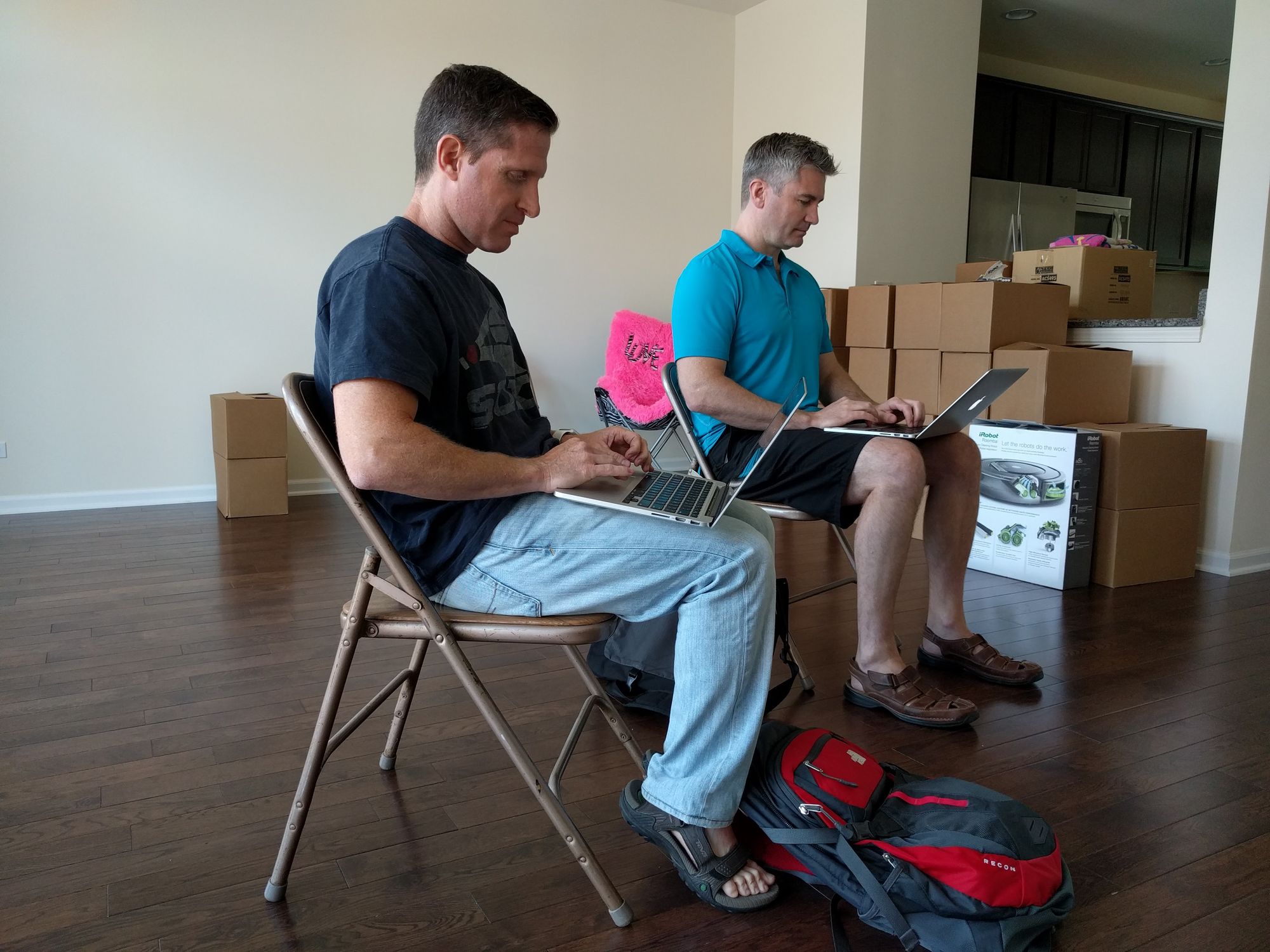
Hello, Rejection
This is the third article in a series I call ApartmentJet: The Story of a Startup, chronicling my most recent startup success.
In June 2016, we held our first unofficial ApartmentJet meeting at my house.
I was in the process of moving in. The rooms were empty. The cupboards were bare. Stacks of boxes lined every wall. I did, however, have two folding chairs and a whiteboard, which is all we needed.

We began with our basic idea. Something multifamily, something “sharing economy”.
We identified four primary stakeholders. Property owners, management companies, residents, and guests. Each stakeholder had separate concerns.
The Stakeholders
Guests (also known as Airbnb travelers) who stayed at a property wanted reliability and security. But because they were often renting secretly, they couldn't call on management for security or maintenance issues.
Residents who hosted those guests wanted to earn money while protecting their homes, valuables, and privacy. But because they were afraid to let management know of their secret guest, they had little recourse if a problem arose.
Management companies wanted to keep the property secure, keep the residents safe, and keep the rent payments flowing. That was difficult with a barage of suitcase-toting travellers staying in the building and throwing late night parties.
Property owners wanted to protect their building as well as its reputation and future valuation. With a more transient population, they faced accelerated deterioration of public amenities, reputational risk that hampered future rents, and potential defaults on loans if properties were used in ways unapproved by their lending banks.
There were also stakeholders we hadn’t yet begun to consider like insurance companies, local government regulators, and even the short term rental marketplaces like Airbnb and Vrbo, who put their own rules in place around refunds and cancellations and insurance.
At that moment, everyone was losing. We wanted everyone to win.
ApartmentJet Alpha
Soon we had sketched out a rough solution. We'd build a content management system that aggregated resident information about an apartment (descriptions, photos, etc.) with content approved by the owner or management company (property photos, brand descriptions, operational details, etc.). We would let owners and management companies set check-in policies and monitor messaging. We’d create global calendars and dashboards so owners would know (and could limit) how many guests were on their properties at any given time. We baked in workflows for content approval. We ideated on revenue sharing agreements between the resident and property.

Guests would now be welcomed at the property. Residents could share on Airbnb with the approval of the property owner. Management companies would have a clear picture of the property’s sharing activity. And property owners could earn extra revenue.
We thought we had a solid path forward. To celebrate, we went to Buffalo Wild Wings across the street for lunch and beers. There, Eric told us about his most recent domain name acquisitions. Acquiring domains had long been a passion of his. Thus the name ApartmentJet officially entered our lexicon.
I’ve always been a fan of more abstract naming conventions, and I did my best to think up a better name, but the battle was hopeless. Eric loved the name. Over the years, we’ve been asked many times what the name signified. Most people guessed, half jokingly, that our goal was to turn decommissioned jet airplanes into apartments. Honestly, I don’t remember Eric’s original explanation. I think the name was a play on the phrase “jet set”.
Regardless, the name would stick, and one day it would scroll across the massive NASDAQ MarketSite board in Times Square.
But first we needed a product, funding, a team, and customers.
Our First Round of Feedback
To gauge interest, we reached out to contacts in the multifamily industry. Many of them were clients of our earlier companies. Some we knew to be early adopters, always eager to experiment with more efficient ways to optimize their businesses. Some we knew to be thought-leaders with a solid understanding of the industry’s needs and directions. Others represented huge potential clients who built their own in-house technology but sometimes opted for third party vendors. This is where past industry experience really helped. I don’t believe they’d have taken our meetings if we hadn’t previously provided value for their businesses.
All of them would provide insights into the viability of our solution. Realistic feedback from potential clients is incredibly valuable in the early stages of your product development lifecycle. Customers won’t give you all the answers, but they will help you identify a trajectory that accelerates your product market fit. Of course, when the idea is so new they don’t yet know they need it, you may not get the answers you hoped.
For example, in this situation, everyone told us, quite clearly: No.
The response was overwhelmingly negative, even from people who loved the idea in general.
Meeting after meeting went like this. “No. No way. Not a chance. We don’t want our residents listing on Airbnb. No. If they're doing it, we want it to stop." The often unspoken truth was that they knew it was happening, but they didn't want to acknowledge it was happening, because it could lead to liability.
It was, as Eric had identified several months earlier, a very touchy subject.
That summer, we hit a two month wall of negativity. “It’s a good idea, but it’s not for us. We will never support our residents listing on Airbnb.”
To be honest, in the whole ApartmentJet saga, this may have been the most formative period. We could’ve given up. We could have gone back to the CRM idea. We could've returned to consulting work.
Instead, we brainstormed. We rallied. We looked for ways to make this idea palatable to owners and operators. Airbnb wasn't going away. The sharing economy wasn't going away. Operators could build anti-Airbnb language into their leases all day long, but if they were afraid to enforce that language, the problem would remain.
Besides, how long could they fight against something their customers demanded? Soon there would be entire apartment complexes devoted to short term rentals. The world was changing. They would get on board. We knew there was a way everyone could benefit.
But most of all, we were determined to prove them wrong. So we went back to that empty room with two chairs and a whiteboard. And, as Eric likes to say, “We pivoted.” Just a little. But it made all the difference.
Next: A Pre-Launch Pivot
Previous: Some Origin Stories Being with a Phone Call
Table of Contents: ApartmentJet: The Story of a Startup